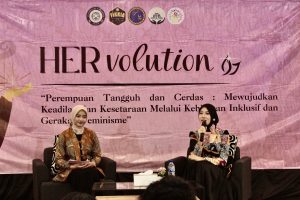UNAIR NEWS – The release of the maternity leave extension in the Maternal and Child Welfare bill draft (RUU KIA) has received various responses from the community, especially female workers. On the other hand, most people worry about the consequence of policy.
However, experts believe that the RUU KIA comes in handy, especially in regard to other regulations. In line with the statement, UNAIR Employment Law Expert Prof Dr M Hadi Subhan SH CN MH said that problems may arise if the bill is left unsynchronized.
“That’s not quite right. This does not mean the RUU KIA can override the Manpower Law. If it stands alone, the company regulates labor regulations more specifically than RUU KIA,” the UNAIR Director of Student Affairs told UNAIR NEWS on Thursday, June 28, 2022.
If it leads to the Manpower Law, Hadi explained, the government must comprehensively escort. Not only regulating the leave provisions but also the leave consequences regulation. For instance, the company will pay the employee’s salary for 3 months and the government will provide subsidies for another 3 months, with a side note: the company cannot terminate the employment relationship (layoff, -ed).
“Actually, there is job loss guarantee. Laid-off employees are guaranteed for 6 months of salary by the state. Hopefully, if there will be maternity leave, the state would also cover it. Because, charging the costs to the company will cause several effects, including uncompetitive companies, high production prices which leads to imports,” he explained.

Roles of Government
The lecturer of UNAIR Faculty of Law stated that the father holds an important role to help and psychologically support the mother post-childbirth to prevent the stunting in children. Responding to the limited access of women workers, Prof Hadi emphasized that the government should always escort the law.
If the company does not properly implement maternity leave on RUU KIA, it becomes the government’s responsibility through the Labor Inspector to ensure the proper implementation of labor laws. Constitutionally, Article 27 reads that ‘every citizen has the right to work and a decent living based on humanity’.
“There will be administrative sanctions. For example, if the company denies a leave request or cuts employee’s rights, the Labor Inspector will take action under the Ministry of Manpower,” he concluded.
Author: Balqis Primasari
Editor: Nuri Hermawan









